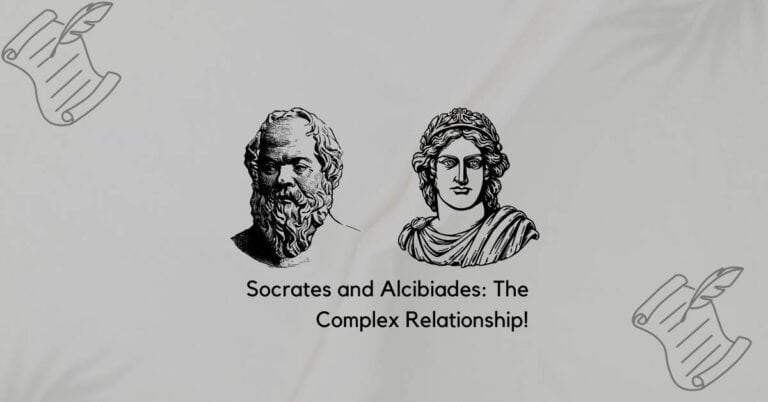Socrates’ View on Love: The Ladder to Wisdom!
Have you ever wondered if there’s more to love than just butterflies and fireworks?
Socrates, the famous thinker from ancient Greece, wasn’t exactly known for being mushy. But guess what? This Philosopher, who loved asking questions, had some pretty interesting ideas about love.
Let’s explore Socrates’ views on love and see if this philosophy giant can teach us something new about this age-old mystery.
Types of Love in Socrates’ Time
Eros:
For the ancient Greeks, love wasn’t quite as mushy as Valentine’s Day cards make it seem. The most common type of love, called Eros, was all about physical beauty – that feeling when you see someone and your jaw drops (in a good way!).
Imagine Cupid with his bow and arrow, but instead of hearts, he’s shooting lightning bolts straight at your eyes!
Eros and its Dual Nature:
In ancient Greek thought, Eros embodied a dual nature. On one hand, it represented the lower physical desires that could lead to obsession and loss of control, potentially causing chaos in human lives.
On the other hand, it was seen as a divine force that could inspire and elevate the soul, leading it toward truth and beauty.
This dual nature of Eros reflects the broader Greek understanding of love and human emotion as forces deeply intertwined with the corporeal and spiritual aspects of life.
With its capacity to inspire both the pursuit of immediate physical pleasure and the loftiest intellectual and spiritual goals, Eros remains a compelling symbol of the complexity and depth of human desire.
Philia & Agape:
In addition to Eros, Greek philosophy recognizes other forms of love, each with its distinct characteristics and importance. Two significant types are Philia and Agape.
Philia (Friendship)
Philia represents a profound, affectionate love often expressed between friends. Unlike Eros, which can often possess a physical or passionate dimension, Philia is based on mutual respect, shared values, and a deep understanding between individuals.
It extends beyond mere companionship, encompassing loyalty, virtue, and equality. Aristotle, in particular, emphasized Philia in his works, considering it an essential component of a fulfilled life.
He distinguished between different kinds of friendships, noting that the highest form of Philia is based on the mutual appreciation of the goodness of the friends and is not driven by need or pleasure alone.
Agape (Selfless Love)
Agape refers to a selfless, unconditional love that seeks the well-being of others without expecting anything in return. It transcends personal desires and encompasses a universal, benevolent love towards all beings.
Agape is often associated with Christian theology, where God’s infinite love for humanity exemplifies it.
However, its roots can also be traced back to ancient Greek thought, where it connoted a general affection or deeper sense of “true love” rather than the physical attraction suggested by Eros.
In a broader sense, Agape encompasses a wide range of caring, loving activities and principles, promoting the idea that love is a motivating force for good.
Both Philia and Agape play crucial roles in Greek philosophy, representing the ethical and communal aspects of love that contribute to a harmonious and virtuous society.
They contrast with and complement Eros, together forming a comprehensive view of love’s role in human experience and moral development.
Love in “The Symposium”
“The Symposium” by Plato is a foundational text in Western philosophy that provides a rich exploration of the concept of love (Eros) through a series of speeches delivered by different characters at a banquet.
The setting itself—a symposium or drinking party—allows for a diverse range of perspectives on love to emerge, reflecting the complexity and multifaceted nature of love in human life.
Socrates, as one of the participants, delivers a profound discourse on love, drawing on his conversation with Diotima, a wise woman who serves as his mentor in matters of love.
Socrates’ Dialogue on Love: The Discussion with Diotima
Socrates recounts to the guests his dialogue with Diotima, who challenges and refines his understanding of love. Diotima presents love not as the object of beauty and goodness but as the desire for these eternal qualities.
She introduces the concept of the “Ladder of Love,” a metaphorical ascent that begins with the physical attraction to individual bodies and evolves into an appreciation for all physical beauty.
This ascent continues towards a love for the beauty of minds, then to the beauty of laws and institutions, and finally, to the beauty of knowledge itself, culminating in the contemplation of the Form of Beauty—an eternal, immutable, and absolute form of beauty beyond the physical realm.
The Immortal Nature of Love and Its Role in Achieving Immortality
Diotima further explains to Socrates that love is inherently linked to the human desire for immortality.
This desire manifests in two principal ways: the physical act of procreation, where individuals seek to perpetuate themselves through their offspring, and the more spiritual or intellectual creation of virtue and wisdom, which can achieve a form of immortality through the enduring impact of one’s contributions to society and knowledge.
The immortal nature of love, according to Diotima, lies in its ability to constantly strive towards the good and the beautiful, driving individuals to leave behind something of eternal value.
Whether through children, virtuous deeds, or intellectual achievements, the essence of love motivates humans to transcend their mortality by contributing to a legacy that outlives their physical existence.
In “The Symposium,” Plato, through Socrates and Diotima, presents a comprehensive and nuanced view of love.
This view elevates love from mere physical attraction to a powerful force that propels individuals toward the good, the beautiful, and ultimately, the eternal.
Love, in its quest for immortality, becomes a central aspect of the human experience, intimately connected with the pursuit of virtue and the desire to contribute to the greater good of humanity.
This philosophical exploration not only underscores the complexity of love but also its significance in human life, offering insights that remain relevant to contemporary discussions on the nature and purpose of love.
The Ladder of Love:
Diotima’s concept of the “Ladder of Love” is one of the most evocative and enduring ideas presented in Plato’s “Symposium.”
It describes a metaphorical journey of ascent, where an individual moves through different stages of appreciating beauty, leading them toward the ultimate wisdom.
This journey begins with the simplest and most tangible form of beauty—physical attraction—and progressively transcends to the highest and most abstract form of beauty, which is wisdom itself. Here’s how the ascent unfolds:
1. Physical Beauty: The first rung of the ladder involves the attraction to physical beauty. It’s where love begins for most, grounded in Eros or sexual desire. This is a natural starting point, but it’s merely the initial, most accessible form of beauty.
2. Beauty of the Soul: Ascending the ladder, the individual begins to value the beauty within a person—their soul, character, and virtues. This appreciation of inner beauty marks a significant shift from the purely physical and hints at the lover’s growing capacity for deeper, more meaningful forms of love.
3. Beauty of Actions and Laws: Further up, love extends beyond individuals to the beauty of actions and laws that govern ethical and just living. This stage reflects a broader appreciation for the structures and principles that facilitate virtue and goodness in society.
4. Beauty of Knowledge: The penultimate step involves a love for knowledge and the beauty of wisdom itself. It transcends the physical and the moral to embrace the intellectual. Here, love becomes a driving force for philosophical inquiry and understanding.
5. The Form of Beauty: The final and highest point of the ladder is the contemplation of the Form of Beauty—an eternal, immutable, and perfect form of beauty that exists beyond the physical world. This is the ultimate goal of the ascent, where love culminates in a profound understanding and appreciation of absolute beauty, leading to true wisdom.
Procreation as a Desire to Create Everlasting Beauty
Diotima also discusses procreation, both physical and spiritual, as an inherent desire to create beauty that achieves immortality. In the physical sense, humans procreate to leave behind a part of themselves, ensuring a form of continuity and immortality through their offspring.
On a higher level, the creation of beauty manifests through virtuous deeds, intellectual achievements, and artistic creations.
These contributions to the world are ways individuals achieve a lasting legacy, making their mark on the tapestry of human history and culture.
Through these acts, the lover engages in a creative process that aspires to the eternal, seeking to immortalize beauty in forms that surpass the limitations of human life.
Love as a Lack and a Desire for Wholeness
Diotima posits that love stems from a fundamental lack or need within ourselves—a yearning for something good and beautiful that we perceive as missing.
This concept of love as a form of desire challenges the notion that love is merely an appreciation for what is beautiful and instead frames it as a dynamic force propelled by a sense of incompleteness.
We seek union with the beloved or the idea of beauty itself to fill this void, to become whole. This pursuit of wholeness is not just about personal fulfillment but is tied to the larger quest for beauty and goodness in life.
Love, therefore, is both a recognition of our own deficiencies and an aspirational drive towards completeness, propelling us on the journey up the Ladder of Love towards the ultimate beauty and wisdom.
This transformative power of love reveals its dual nature as both a lack and a catalyst for growth and understanding, highlighting the intricate relationship between our human limitations and our highest aspirations.
The Role of Love in Attaining Knowledge
In the philosophical framework presented by Diotima in Plato’s “Symposium,” love—particularly the love for wisdom (philosophy)—serves as a pivotal driving force for self-improvement and the pursuit of knowledge.
This concept is integral to understanding how the ancient Greeks, particularly Socrates, viewed the role of Eros in human life.
For Socrates, and subsequently for many philosophers who followed, the love of wisdom isn’t just an academic pursuit; it’s a passionate engagement with the world that demands constant learning, questioning, and striving for a deeper understanding of the universe and our place within it.
A lover of wisdom is portrayed as someone who recognizes their own ignorance and is driven by a desire to fill this gap in understanding.
This relentless pursuit is motivated by love—a deep-seated yearning to grasp the truth of things, uncover the underlying principles that govern reality, and achieve a form of intellectual and spiritual fulfillment.
In this context, love acts as the catalyst for a lifelong journey of discovery, where the pursuit itself becomes as significant as the knowledge attained.
Analysis and Explanations of Socrates’ Perspective on Love
As articulated in “The Symposium,” Socrates’ view on love has been subject to various criticisms and interpretations over the centuries.
One common criticism is the perceived downplaying of the emotional and personal aspects of love in favor of its intellectual and abstract dimensions.
Critics argue that this approach neglects the rich, complex nature of love as experienced in human relationships, reducing it to a mere stepping stone toward philosophical enlightenment.
Different interpretations of “The Symposium” and the concept of love within it have also emerged, reflecting the diverse perspectives and values of readers and scholars throughout history.
Some interpretations focus on the allegorical aspects of the dialogue, seeing in it a profound exploration of human psychology, spiritual ascent, and the quest for meaning. Others highlight the social and cultural dimensions of the text, examining how it reflects and critiques the norms and ideals of love in ancient Greek society.
If you’re interested in learning more about Socrates and his relationships with his two wives, Xanthippe and Myrto, we have a dedicated blog post on this topic.
The Enduring Legacy of Socrates’ Ideas on Love
The ideas on love presented by Socrates in “The Symposium” have left a lasting impact on Western thought, influencing philosophical, theological, and literary works across millennia.
His conceptualization of love as a force that drives the pursuit of beauty, truth, and wisdom has permeated various aspects of Western culture, shaping its ideals and understanding of love’s role in human life.
In the modern context, Socrates’ connection between love and the pursuit of wisdom remains highly relevant. It suggests that at the heart of love lies the potential for growth, self-discovery, and the transcendence of our limitations.
This perspective encourages a view of love as an expansive, dynamic force that not only draws us closer to others but also propels us on a journey of intellectual and spiritual enrichment.
Moreover, in an age characterized by rapid change and a constant influx of information, the Socratic principle of love as a quest for deeper understanding offers a valuable counterpoint to superficial engagements and the undervaluing of wisdom.
It reminds us that at the core of meaningful lives is a love-driven pursuit of knowledge, beauty, and truth, highlighting the timeless nature of Socrates’ insights into love and its transformative power.
In summary, Socrates and Diotima’s conversation was a great lesson in understanding the true meaning of love. If you’re curious about Socrates and his relationships with other philosophers or want to learn about Socrates’ views on happiness, we’ve got dedicated blogs on them.
Conclusion
Socrates’ exploration of love, particularly through the dialogues in Plato’s “Symposium,” offers a profound and multifaceted view of love as an essential component of the human experience.
At its core, Socrates presents love as a journey—an ascent that begins with the physical attraction to beauty but ultimately leads to a deeper, more meaningful engagement with the world.
This journey is not merely about the pursuit of pleasure or companionship; it is about the soul’s quest for the good, the beautiful, and the true.
Central to Socrates’ view is the concept that love arises from a desire for good—something that is lacking within us and sought in the beloved or in the ideals we hold dear.
This desire propels us forward, motivating our actions and guiding our aspirations toward achieving a form of immortality, whether through procreation, the creation of beauty, or the pursuit of virtue.
Moreover, Socrates elevates love to a path to wisdom. Love, in its highest form, drives the pursuit of knowledge, leading us to question, reflect, and seek an understanding of the fundamental truths of existence.
This pursuit is not solitary; it is a communal journey where shared love for wisdom fosters connections that are intellectually and spiritually enriching.
Through the lens of Socrates, love is not a static state of being but a dynamic force that shapes our lives, our relationships, and our quest for meaning. It challenges us to look beyond the superficial and to engage with the world and with others in a more profound and fulfilling way.
As we reflect on Socrates’ views on love, it invites us to ponder: How does our own understanding of love align with this philosophical journey?
Are we open to the transformative power of love in guiding us toward wisdom and a deeper connection with the world around us?
This question encourages us to explore our own experiences and beliefs about love, inviting a personal journey of discovery that mirrors the philosophical ascent described by Socrates.



